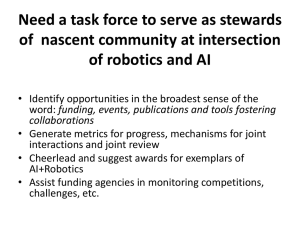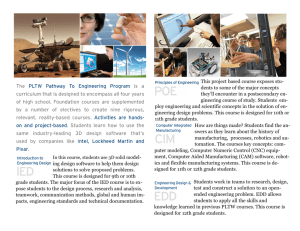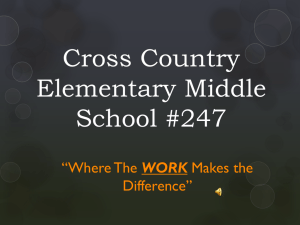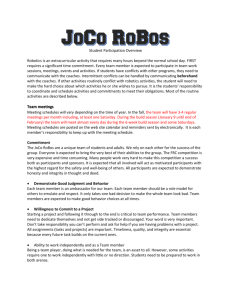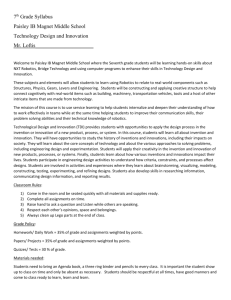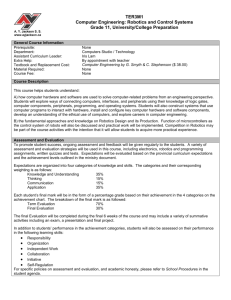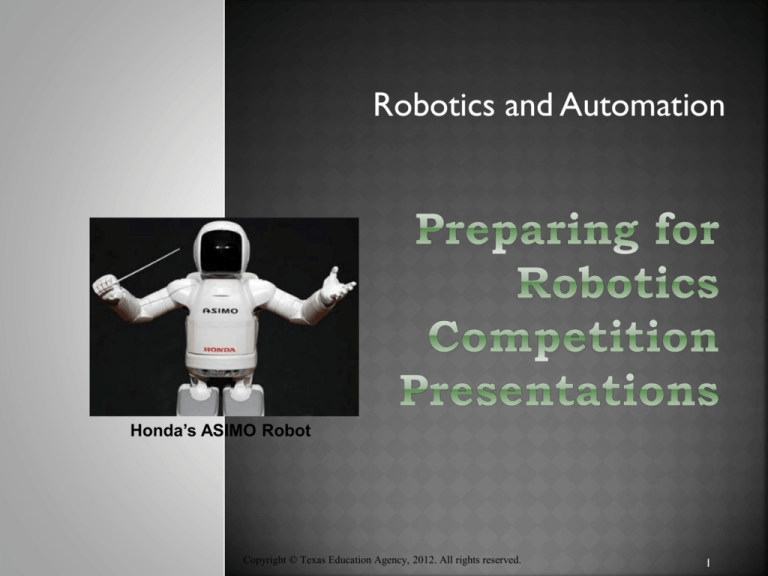
Robotics and Automation
Honda’s ASIMO Robot
Copyright © Texas Education Agency, 2012. All rights reserved.
1
The
purpose of this lesson is allow students to
demonstrate the skills necessary for success in
the workplace.
Students
will demonstrate effective oral and
written communication skills using a variety of
software applications and media.
Copyright © Texas Education Agency, 2012. All rights reserved.
2
Students
enrolled in this course will demonstrate
knowledge and skills necessary for the robotic and
automation industry. Through implementation of
the design process, students will transfer advanced
academic skills to component designs in a projectbased environment. Students will build prototypes
or use simulation software to test their designs.
Additionally, students explore career
opportunities, employer expectations, and
educational needs in the robotic and automation
industry.
Copyright © Texas Education Agency, 2012. All rights reserved.
3
TEKS
130.370(c)(1) The student demonstrates the
skills necessary for success in the workplace.
TEKS
130.370(c)(J)Demonstrate effective oral and
written communication skills using a variety of
software applications and media.
-
Section 1 – Software Applications and Media
Section 2 – Preparing for Robotics Competition
Presentations
Copyright © Texas Education Agency, 2012. All rights reserved.
4
In
this lesson, the Robotics Presentation Team
members will learn about the various software
applications and media technologies available for
robotics presentation.
Copyright © Texas Education Agency, 2012. All rights reserved.
5
The terms and definitions listed below are discussed in this
lesson. Please review before proceeding with this lesson.
Terms
Definitions
Software Applications
The Merriam Webster
Online Dictionary defines
software applications as
“the programs and related
information used by a
computer.”
Copyright © Texas Education Agency, 2012. All rights reserved.
6
The terms and definitions listed below are discussed in this
lesson. Please review before proceeding with this lesson.
Terms
Definitions
Media Technologies
Is a generic term that refers
to various topics: digital
media, multimedia, and
storage and Web 2.0
technologies.
Copyright © Texas Education Agency, 2012. All rights reserved.
7
The Robotics Team may use various software
applications and media technologies for their
robotics competition presentations.
Application
Purpose
Microsoft PowerPoint
Desktop Presentation Program
Prezi
http://prezi.com
Internet Cloud-based
Presentation Software
Adobe Flash
Animation Effects and Import
Video Program
Open Office Impress
Free Open Source Presentation
Technology
Adobe Photoshop
Editing Photos Program
www.clipart.com
Free Downloadable Images
Copyright © Texas Education Agency, 2012. All rights reserved.
8
In
this lesson, the Robotics Presentation Team
members are introduced to possible content to
include in their robotics competition
presentations.
The
Robotics Presentation Team members will
demonstrate their oral and written
communication skills using a variety of software
applications and media.
Copyright © Texas Education Agency, 2012. All rights reserved.
9
The terms and definitions listed below are discussed in this
lesson. Please review before proceeding with this lesson.
Terms
Definitions
Oral Communication
Is “communication by word
of mouth.”
Written Communication
Is “communication by
means of written symbols
(either printed or
handwritten).”
Copyright © Texas Education Agency, 2012. All rights reserved.
10
Students may present at the FIRST Robotics Competition.
FIRST was founded in 1989 to inspire young people's interest and
participation in science and technology.
Copyright © Texas Education Agency, 2012. All rights reserved.
11
Students may present at the BEST Robotics Competition.
In 1993, this robotic competition originated when two Texas Instruments (TI)
engineers, Ted Mahler and Steve Marum, were serving as guides for
Engineering Day at their company site in Sherman.
Copyright © Texas Education Agency, 2012. All rights reserved.
12
Your
Robotics Team may include the following
content in your robotics presentation.
3D Model Drawing of Robot
Competition Details
Team Logo
Robot Design Team Activities
Title Slide with Team Logo
Video Clips of Team Activities
Who We Are (Introduce Team)
Team Outreach Activities
Picture of Team
Team STEM Activities
History of FIRST Robotics or
BEST Robotics
Team Schedule
Mission and Vision of FIRST
Robotics or BEST Robotics
Team Goals
Competitions Sponsored by
FIRST Robotics or BEST
Robotics
Sponsorship Information
Copyright © Texas Education Agency, 2012. All rights reserved.
13
The purpose of an oral and written presentation is
to communicate.
To communicate effectively, you must state your
facts in a simple, concise and interesting manner.
There are several steps to an effective
presentation.
Copyright © Texas Education Agency, 2012. All rights reserved.
14
STEP 1. KNOW YOUR SUBJECT MATTER
1.
2.
3.
It is very important that you research every nuance of the
robotics competition and robotics.
Read reports and look up information about the robotics
with the specific purpose of writing a presentation script.
When examined in this light, new ideas and alternative
ways of thinking often develop. The ability to present a
subject with confidence directly affects your audience's
impressions and will help keep their attention.
Copyright © Texas Education Agency, 2012. All rights reserved.
15
STEP 2. KNOW YOUR AUDIENCE
1. Performing a small amount of research into the makeup of
your audience (your judges) will reap large benefits on
presentation day.
Copyright © Texas Education Agency, 2012. All rights reserved.
16
1.
2.
STEP 3. KNOW TEAM (and their limits)
We all must push our limits and willingly bite off more than
we may be comfortable swallowing on occasion -- this is
how we learn and grow.
Intimately related to Know Your Audience above, your
'limits' are just where you may or may not tread,
depending on the makeup of your audience and your
relationship with them.
Copyright © Texas Education Agency, 2012. All rights reserved.
17
1.
STEP 4. DEVELOP A THEME
All presentations, regardless of their complexity, are
designed with a single purpose. State that purpose to
yourself at the beginning of the development process.
Keep this purpose in mind always.
Copyright © Texas Education Agency, 2012. All rights reserved.
18
1.
STEP 5. PREPARE YOUR SCRIPT
The script should consist of the same four basic parts, an
opening, body, summary and closing. Presenters may
write simple notes on 3 x 5 file cards.
THE OPENING
The opening of the presentation sets the stage for what is to
follow. Judges are introduced and the purpose of the
presentation is stated. Presenters should also present a
VERY BRIEF summary or outline of the points to be
covered. This helps keep your audience oriented properly
within the framework of your script.
Copyright © Texas Education Agency, 2012. All rights reserved.
19
STEP 5. PREPARE YOUR SCRIPT
BODY
The body is the section of the script in which the bulk of the
subject matter is presented. The body of a long presentation
should be separated into smaller, easily assimilated
modules. Each module or sub-section should make a single
point or convey one idea. These sub-sections should each
have their own simple opening, body and summary.
Copyright © Texas Education Agency, 2012. All rights reserved.
20
STEP 5. PREPARE YOUR SCRIPT
SUMMARY
The summary section of the presentation should be very
brief and simple. Here is your chance to reinforce the central
theme and purpose of your presentation. Briefly emphasize
the key points and main ideas of your script in this section.
Copyright © Texas Education Agency, 2012. All rights reserved.
21
STEP 5. PREPARE YOUR SCRIPT
CLOSING
In a well structured closing, points raised during the
question and answer session (if any) are summarized and
any handout material that was not required during the
presentation is distributed. Handout material which
emphasizes each key point or idea permits the judges to
review the subject and assures that your words will remain
fresh in their minds. Handout material should not be
distributed before a presentation unless it is critical to the
theme since it invariably leads to judges distraction.
Copyright © Texas Education Agency, 2012. All rights reserved.
22
1.
2.
STEP 6. SELECT THE PROPER VISUAL AIDS
With the script developed, the selection of the proper
visual aids should be simple.
Determine if your team presentation should be displayed
using Microsoft PowerPoint, Open Office Impress or via
Prezi (Internet Cloud-based Presentation Software).
Copyright © Texas Education Agency, 2012. All rights reserved.
23
1.
2.
3.
4.
STEP 7. PREPARE A STORY BOARD
A story board’s main purpose is to give a general view of the
presentation and communicate the important items.
You can make your story board using file cards and post- it
notes. Changes at the story board level are relatively
inexpensive since no images have been produced.
Create your story board. The story board should consist of a
sketch of each individual image, text information, and video
information. Each sheet should specify colors, formats, fonts, and
values for graphs.
You may rehearse the script and easily rearrange, revise, delete
from and add to your presentation.
Copyright © Texas Education Agency, 2012. All rights reserved.
24
1.
STEP 8. PRODUCE THE VISUALS
Use Adobe Photoshop or a different computer graphics
application to make changes and alterations to your
visuals.
Copyright © Texas Education Agency, 2012. All rights reserved.
25
1.
2.
STEP 9. REHEARSE--REHEARSE--REHEARSE
The final script and outline or story board allow you to
rehearse your presentation even before the visuals are
completed.
Tape and review your rehearsal until you are satisfied with
your presentation.
Copyright © Texas Education Agency, 2012. All rights reserved.
26
1.
2.
3.
4.
5.
STEP 10. PRESENTATION DAY
Arrive and set up early.
Bring extra copies of the presentation handout material.
Speak clearly and with authority.
Make certain that the judges questions have been
answered.
Lastly, thank everyone for attending.
Copyright © Texas Education Agency, 2012. All rights reserved.
27
STEP 11. FOLLOW UP
1.
Receive feedback from the judges to ensure that your
presentation goals were met.
2.
Create a questionnaire distributed at the end of your
presentation. It can be a source of critical information for
future presentations.
3.
Encourage the judges to write questions that they did not
get answered during the presentation.
Copyright © Texas Education Agency, 2012. All rights reserved.
28
How your grade will be calculated.
Graded Elements
Total Points
7 Required presentation elements
70
Proofreading, Grammar and Spelling
20
Reflection
10
Total Points
100
Copyright © Texas Education Agency, 2012. All rights reserved.
29
Instructions:
Students will prepare a Prezi or a
Microsoft PowerPoint presentation on the FIRST
Robotics Competition and the BEST Robotics
Competition.
1. Use the Prezi presentation software to create your Internet cloud-based
presentation software.
http://prezi.com
2. Use the FIRST Robotics Competition website to learn more about the
robotics competition.
http://www.usfirst.org/
Copyright © Texas Education Agency, 2012. All rights reserved.
30
3. Use the BEST Robotics Competition website to learn more about the
robotics competition.
http://www.bestinc.org/
You will need to include the following information in your presentation.
History of the FIRST Robotics Competition and BEST Robotics Competition.
When and where are the FIRST Robotics BEST Robotics Competitions in your
local area?
An explanation of what is the FIRST Robotics Competition and the BEST
Robotics Competition.
What are the similarities between the FIRST Robotics Competition and BEST
Robotics Competition?
What are the differences between the FIRST Robotics Competition and BEST
Robotics Competition?
Copyright © Texas Education Agency, 2012. All rights reserved.
31
What robotics competition would you prefer to participate in and why?
Find a YouTube or Google video of the FIRST Robotics Competition and
BEST Robotics Competition into your presentation.
Reflection: : O*NET Online has detailed descriptions
of the world of work and education for use by job
seekers, workforce development and HR professionals,
students, researchers, and more! Visit the O*NET Online
website (http://www.onetonline.org/). Do you think that
this website may help you locate the
educational/instructional programs in Robotics? What
types of Robotics instructional program opportunities
are listed?
Copyright © Texas Education Agency, 2012. All rights reserved.
32
Merriam-Webster
Online Dictionary http://www.merriam-webster.com/
O-NET Online - http://www.onetonline.org
ClipArt – http://www.clipart.com/en/
FIRST Robotics
http://www.usfirst.org/aboutus/first-history
BEST (Boosting Engineering, Science, and
Technology) http://www.bestinc.org/b_history.php
Copyright © Texas Education Agency, 2012. All rights reserved.
33

